CUC107 Assignment: Cultural Self-Awareness and Intelligence Essay
VerifiedAdded on 2022/12/14
|6
|1311
|215
Essay
AI Summary
This essay critically reflects on the significance of cultural self-awareness in fostering cultural intelligence, drawing on the provided readings and the student's personal experiences. The essay defines both cultural self-awareness and cultural intelligence, highlighting their interconnectedness. It discusses how self-awareness, shaped by cultural norms, values, and societal interactions, influences an individual's understanding of their own culture and others. The student reflects on their experiences relocating to Germany and traveling to Italy, demonstrating how cross-cultural interactions enhance self-awareness and impact cultural intelligence. The essay integrates concepts from several readings, including those by Spencer-Oatey, K.R, Quappe & Cantatore, Sakari Taipale, and Brislin, Worthley, & Macnab, to illustrate the importance of adapting to diverse cultural environments, understanding cultural nuances like vocabulary and body language, and the impact of established and new knowledge in shaping cross-cultural competence. The conclusion emphasizes the role of cultural self-awareness as a foundation for effective cross-cultural communication and the development of a more culturally intelligent perspective.
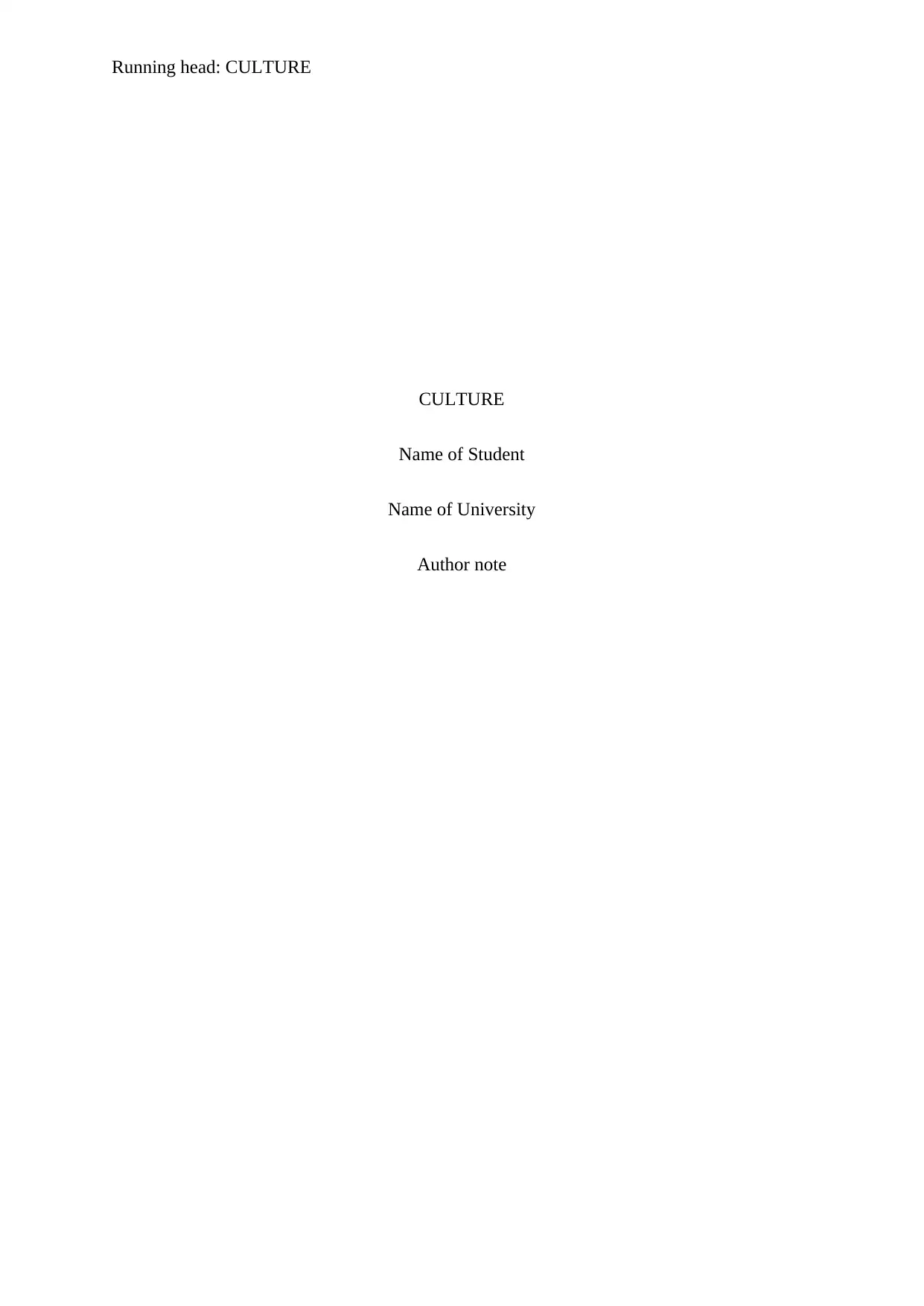
Running head: CULTURE
CULTURE
Name of Student
Name of University
Author note
CULTURE
Name of Student
Name of University
Author note
Paraphrase This Document
Need a fresh take? Get an instant paraphrase of this document with our AI Paraphraser
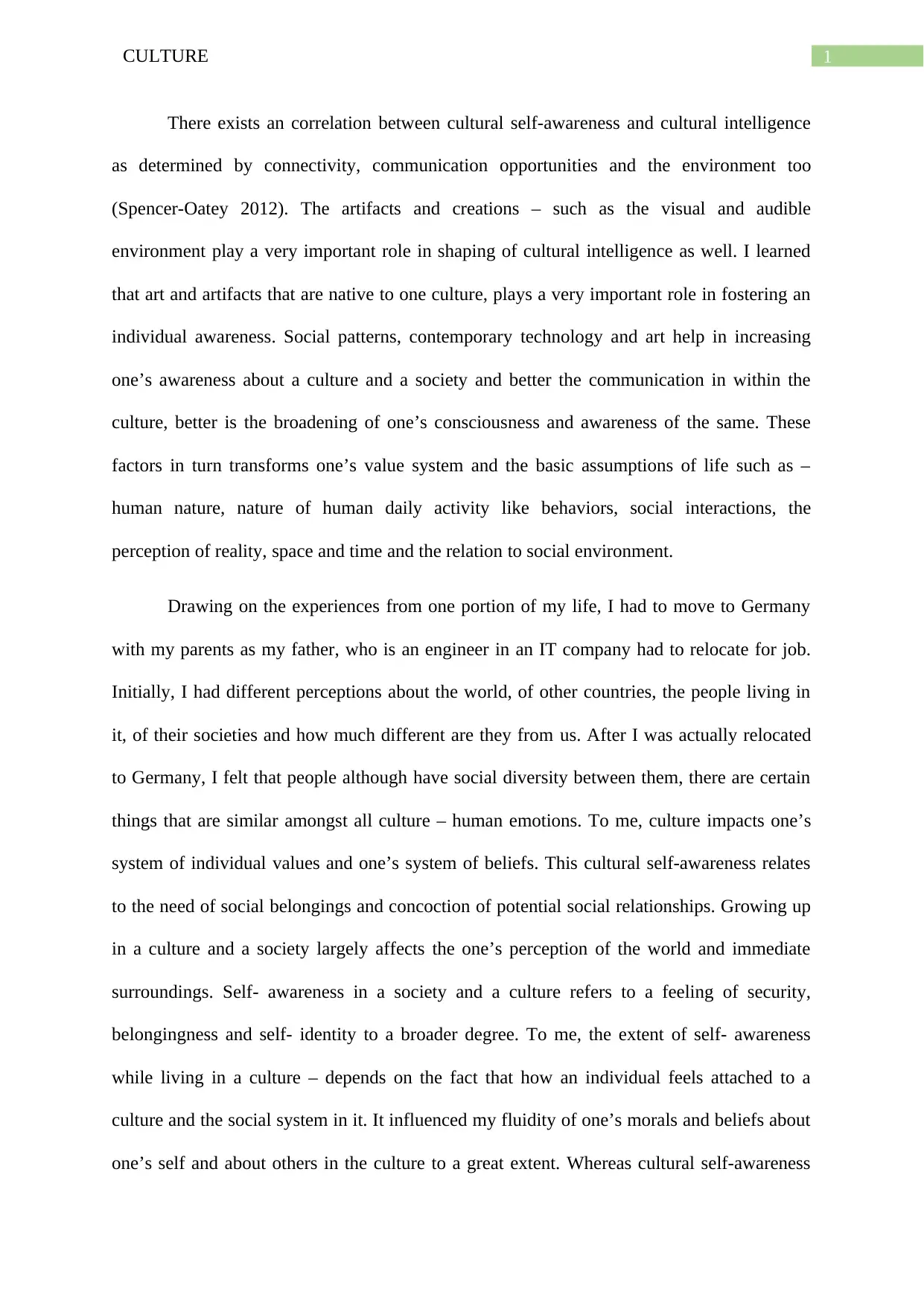
1CULTURE
There exists an correlation between cultural self-awareness and cultural intelligence
as determined by connectivity, communication opportunities and the environment too
(Spencer-Oatey 2012). The artifacts and creations – such as the visual and audible
environment play a very important role in shaping of cultural intelligence as well. I learned
that art and artifacts that are native to one culture, plays a very important role in fostering an
individual awareness. Social patterns, contemporary technology and art help in increasing
one’s awareness about a culture and a society and better the communication in within the
culture, better is the broadening of one’s consciousness and awareness of the same. These
factors in turn transforms one’s value system and the basic assumptions of life such as –
human nature, nature of human daily activity like behaviors, social interactions, the
perception of reality, space and time and the relation to social environment.
Drawing on the experiences from one portion of my life, I had to move to Germany
with my parents as my father, who is an engineer in an IT company had to relocate for job.
Initially, I had different perceptions about the world, of other countries, the people living in
it, of their societies and how much different are they from us. After I was actually relocated
to Germany, I felt that people although have social diversity between them, there are certain
things that are similar amongst all culture – human emotions. To me, culture impacts one’s
system of individual values and one’s system of beliefs. This cultural self-awareness relates
to the need of social belongings and concoction of potential social relationships. Growing up
in a culture and a society largely affects the one’s perception of the world and immediate
surroundings. Self- awareness in a society and a culture refers to a feeling of security,
belongingness and self- identity to a broader degree. To me, the extent of self- awareness
while living in a culture – depends on the fact that how an individual feels attached to a
culture and the social system in it. It influenced my fluidity of one’s morals and beliefs about
one’s self and about others in the culture to a great extent. Whereas cultural self-awareness
There exists an correlation between cultural self-awareness and cultural intelligence
as determined by connectivity, communication opportunities and the environment too
(Spencer-Oatey 2012). The artifacts and creations – such as the visual and audible
environment play a very important role in shaping of cultural intelligence as well. I learned
that art and artifacts that are native to one culture, plays a very important role in fostering an
individual awareness. Social patterns, contemporary technology and art help in increasing
one’s awareness about a culture and a society and better the communication in within the
culture, better is the broadening of one’s consciousness and awareness of the same. These
factors in turn transforms one’s value system and the basic assumptions of life such as –
human nature, nature of human daily activity like behaviors, social interactions, the
perception of reality, space and time and the relation to social environment.
Drawing on the experiences from one portion of my life, I had to move to Germany
with my parents as my father, who is an engineer in an IT company had to relocate for job.
Initially, I had different perceptions about the world, of other countries, the people living in
it, of their societies and how much different are they from us. After I was actually relocated
to Germany, I felt that people although have social diversity between them, there are certain
things that are similar amongst all culture – human emotions. To me, culture impacts one’s
system of individual values and one’s system of beliefs. This cultural self-awareness relates
to the need of social belongings and concoction of potential social relationships. Growing up
in a culture and a society largely affects the one’s perception of the world and immediate
surroundings. Self- awareness in a society and a culture refers to a feeling of security,
belongingness and self- identity to a broader degree. To me, the extent of self- awareness
while living in a culture – depends on the fact that how an individual feels attached to a
culture and the social system in it. It influenced my fluidity of one’s morals and beliefs about
one’s self and about others in the culture to a great extent. Whereas cultural self-awareness
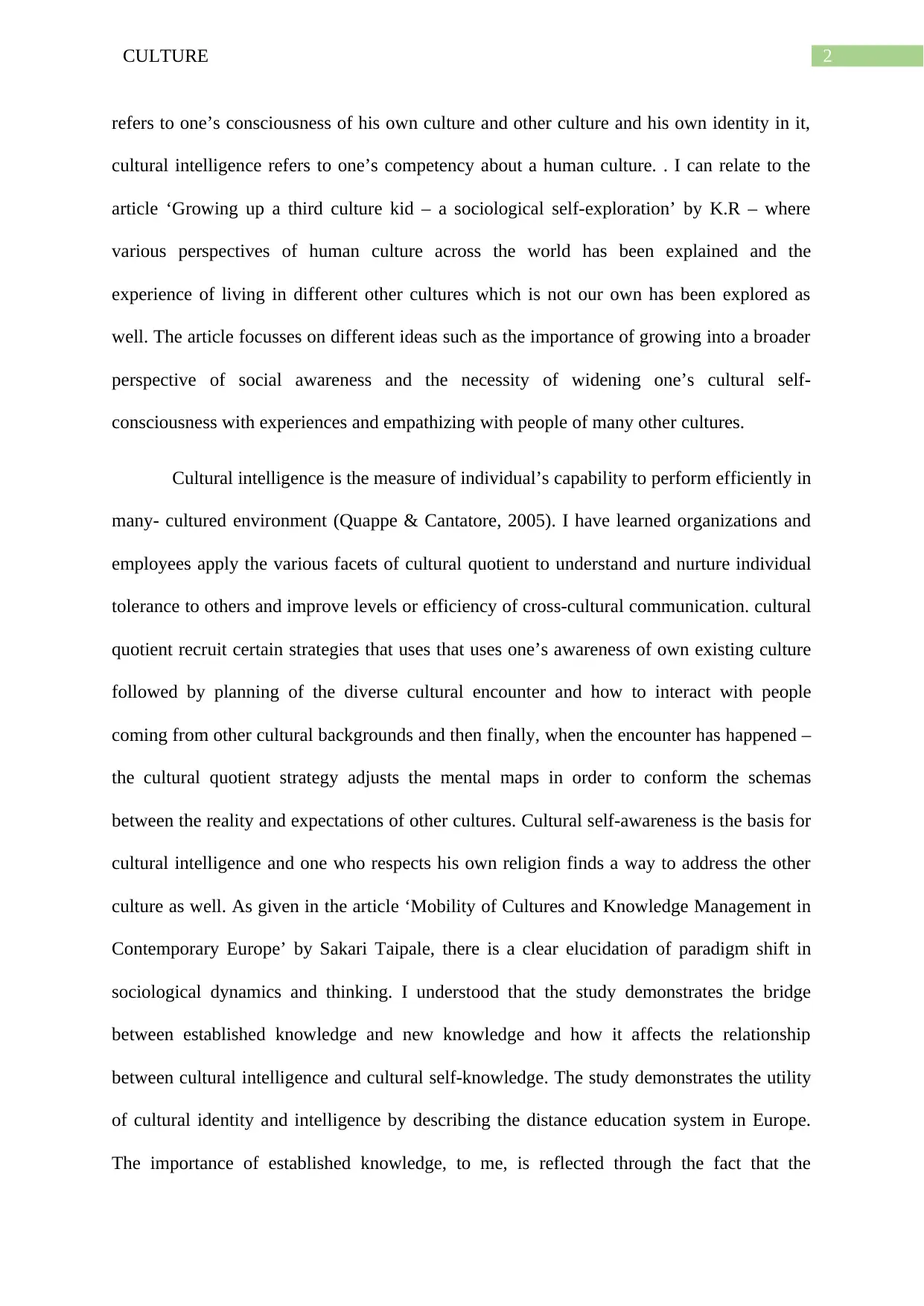
2CULTURE
refers to one’s consciousness of his own culture and other culture and his own identity in it,
cultural intelligence refers to one’s competency about a human culture. . I can relate to the
article ‘Growing up a third culture kid – a sociological self-exploration’ by K.R – where
various perspectives of human culture across the world has been explained and the
experience of living in different other cultures which is not our own has been explored as
well. The article focusses on different ideas such as the importance of growing into a broader
perspective of social awareness and the necessity of widening one’s cultural self-
consciousness with experiences and empathizing with people of many other cultures.
Cultural intelligence is the measure of individual’s capability to perform efficiently in
many- cultured environment (Quappe & Cantatore, 2005). I have learned organizations and
employees apply the various facets of cultural quotient to understand and nurture individual
tolerance to others and improve levels or efficiency of cross-cultural communication. cultural
quotient recruit certain strategies that uses that uses one’s awareness of own existing culture
followed by planning of the diverse cultural encounter and how to interact with people
coming from other cultural backgrounds and then finally, when the encounter has happened –
the cultural quotient strategy adjusts the mental maps in order to conform the schemas
between the reality and expectations of other cultures. Cultural self-awareness is the basis for
cultural intelligence and one who respects his own religion finds a way to address the other
culture as well. As given in the article ‘Mobility of Cultures and Knowledge Management in
Contemporary Europe’ by Sakari Taipale, there is a clear elucidation of paradigm shift in
sociological dynamics and thinking. I understood that the study demonstrates the bridge
between established knowledge and new knowledge and how it affects the relationship
between cultural intelligence and cultural self-knowledge. The study demonstrates the utility
of cultural identity and intelligence by describing the distance education system in Europe.
The importance of established knowledge, to me, is reflected through the fact that the
refers to one’s consciousness of his own culture and other culture and his own identity in it,
cultural intelligence refers to one’s competency about a human culture. . I can relate to the
article ‘Growing up a third culture kid – a sociological self-exploration’ by K.R – where
various perspectives of human culture across the world has been explained and the
experience of living in different other cultures which is not our own has been explored as
well. The article focusses on different ideas such as the importance of growing into a broader
perspective of social awareness and the necessity of widening one’s cultural self-
consciousness with experiences and empathizing with people of many other cultures.
Cultural intelligence is the measure of individual’s capability to perform efficiently in
many- cultured environment (Quappe & Cantatore, 2005). I have learned organizations and
employees apply the various facets of cultural quotient to understand and nurture individual
tolerance to others and improve levels or efficiency of cross-cultural communication. cultural
quotient recruit certain strategies that uses that uses one’s awareness of own existing culture
followed by planning of the diverse cultural encounter and how to interact with people
coming from other cultural backgrounds and then finally, when the encounter has happened –
the cultural quotient strategy adjusts the mental maps in order to conform the schemas
between the reality and expectations of other cultures. Cultural self-awareness is the basis for
cultural intelligence and one who respects his own religion finds a way to address the other
culture as well. As given in the article ‘Mobility of Cultures and Knowledge Management in
Contemporary Europe’ by Sakari Taipale, there is a clear elucidation of paradigm shift in
sociological dynamics and thinking. I understood that the study demonstrates the bridge
between established knowledge and new knowledge and how it affects the relationship
between cultural intelligence and cultural self-knowledge. The study demonstrates the utility
of cultural identity and intelligence by describing the distance education system in Europe.
The importance of established knowledge, to me, is reflected through the fact that the
⊘ This is a preview!⊘
Do you want full access?
Subscribe today to unlock all pages.

Trusted by 1+ million students worldwide
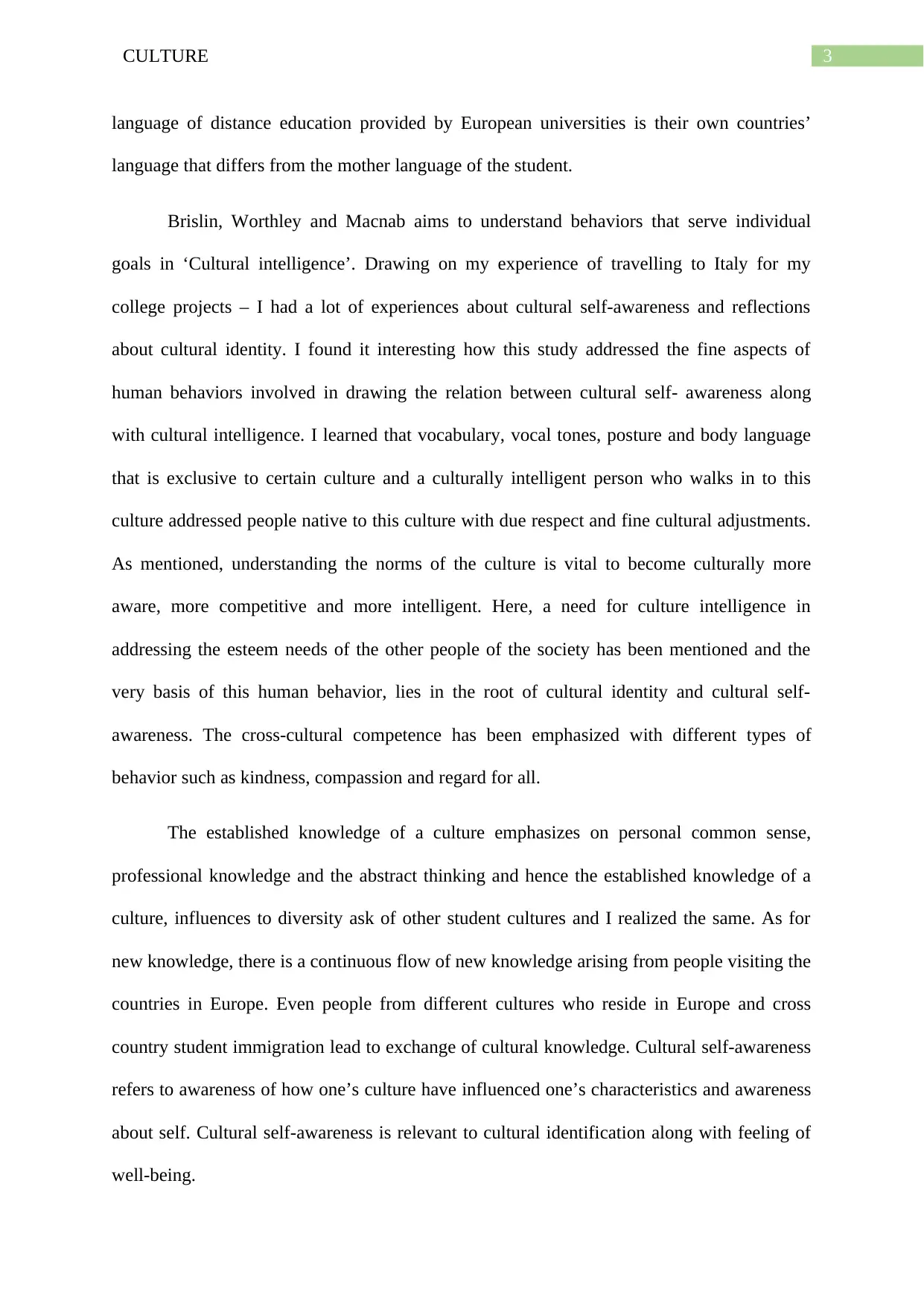
3CULTURE
language of distance education provided by European universities is their own countries’
language that differs from the mother language of the student.
Brislin, Worthley and Macnab aims to understand behaviors that serve individual
goals in ‘Cultural intelligence’. Drawing on my experience of travelling to Italy for my
college projects – I had a lot of experiences about cultural self-awareness and reflections
about cultural identity. I found it interesting how this study addressed the fine aspects of
human behaviors involved in drawing the relation between cultural self- awareness along
with cultural intelligence. I learned that vocabulary, vocal tones, posture and body language
that is exclusive to certain culture and a culturally intelligent person who walks in to this
culture addressed people native to this culture with due respect and fine cultural adjustments.
As mentioned, understanding the norms of the culture is vital to become culturally more
aware, more competitive and more intelligent. Here, a need for culture intelligence in
addressing the esteem needs of the other people of the society has been mentioned and the
very basis of this human behavior, lies in the root of cultural identity and cultural self-
awareness. The cross-cultural competence has been emphasized with different types of
behavior such as kindness, compassion and regard for all.
The established knowledge of a culture emphasizes on personal common sense,
professional knowledge and the abstract thinking and hence the established knowledge of a
culture, influences to diversity ask of other student cultures and I realized the same. As for
new knowledge, there is a continuous flow of new knowledge arising from people visiting the
countries in Europe. Even people from different cultures who reside in Europe and cross
country student immigration lead to exchange of cultural knowledge. Cultural self-awareness
refers to awareness of how one’s culture have influenced one’s characteristics and awareness
about self. Cultural self-awareness is relevant to cultural identification along with feeling of
well-being.
language of distance education provided by European universities is their own countries’
language that differs from the mother language of the student.
Brislin, Worthley and Macnab aims to understand behaviors that serve individual
goals in ‘Cultural intelligence’. Drawing on my experience of travelling to Italy for my
college projects – I had a lot of experiences about cultural self-awareness and reflections
about cultural identity. I found it interesting how this study addressed the fine aspects of
human behaviors involved in drawing the relation between cultural self- awareness along
with cultural intelligence. I learned that vocabulary, vocal tones, posture and body language
that is exclusive to certain culture and a culturally intelligent person who walks in to this
culture addressed people native to this culture with due respect and fine cultural adjustments.
As mentioned, understanding the norms of the culture is vital to become culturally more
aware, more competitive and more intelligent. Here, a need for culture intelligence in
addressing the esteem needs of the other people of the society has been mentioned and the
very basis of this human behavior, lies in the root of cultural identity and cultural self-
awareness. The cross-cultural competence has been emphasized with different types of
behavior such as kindness, compassion and regard for all.
The established knowledge of a culture emphasizes on personal common sense,
professional knowledge and the abstract thinking and hence the established knowledge of a
culture, influences to diversity ask of other student cultures and I realized the same. As for
new knowledge, there is a continuous flow of new knowledge arising from people visiting the
countries in Europe. Even people from different cultures who reside in Europe and cross
country student immigration lead to exchange of cultural knowledge. Cultural self-awareness
refers to awareness of how one’s culture have influenced one’s characteristics and awareness
about self. Cultural self-awareness is relevant to cultural identification along with feeling of
well-being.
Paraphrase This Document
Need a fresh take? Get an instant paraphrase of this document with our AI Paraphraser

4CULTURE
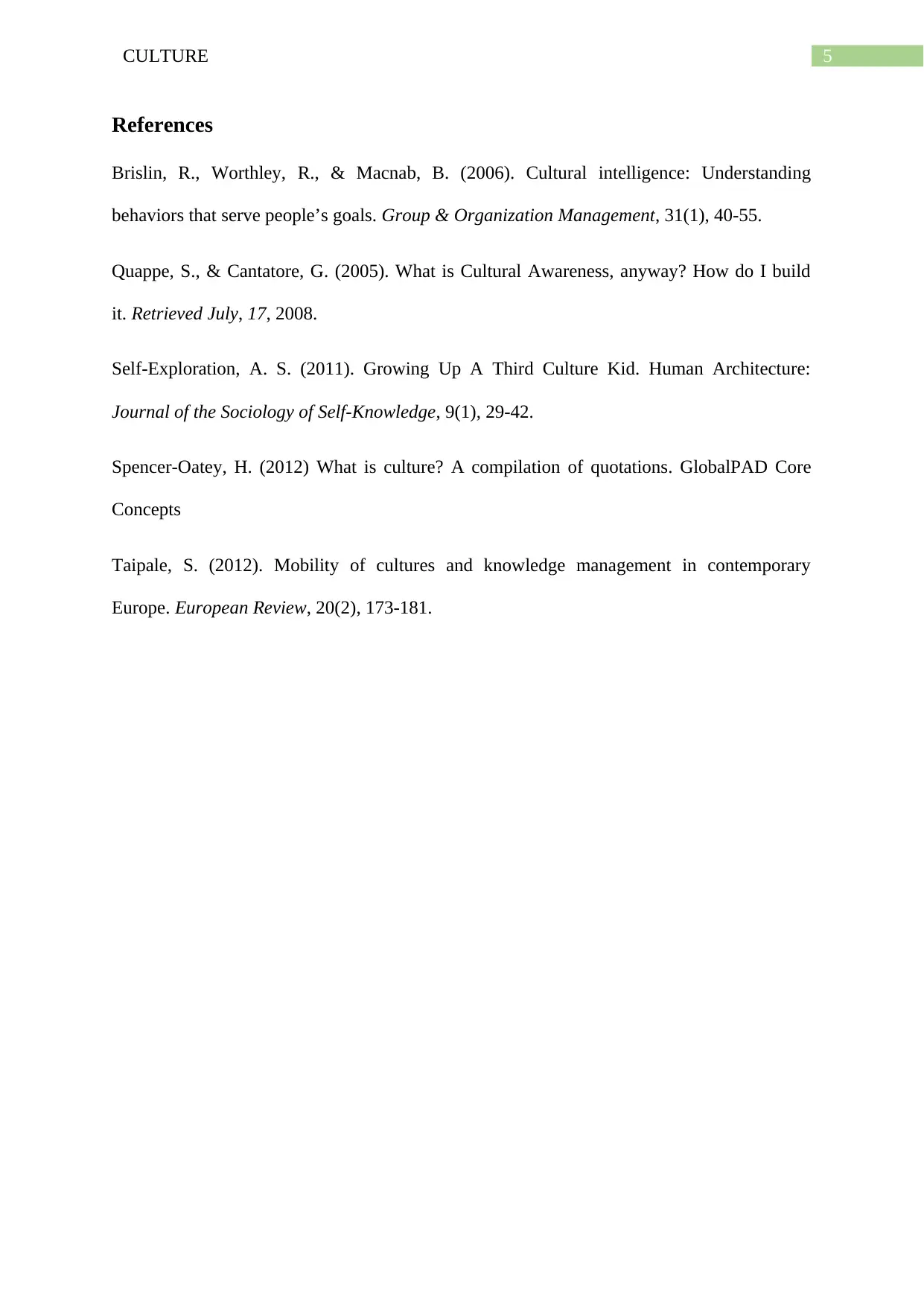
5CULTURE
References
Brislin, R., Worthley, R., & Macnab, B. (2006). Cultural intelligence: Understanding
behaviors that serve people’s goals. Group & Organization Management, 31(1), 40-55.
Quappe, S., & Cantatore, G. (2005). What is Cultural Awareness, anyway? How do I build
it. Retrieved July, 17, 2008.
Self-Exploration, A. S. (2011). Growing Up A Third Culture Kid. Human Architecture:
Journal of the Sociology of Self-Knowledge, 9(1), 29-42.
Spencer-Oatey, H. (2012) What is culture? A compilation of quotations. GlobalPAD Core
Concepts
Taipale, S. (2012). Mobility of cultures and knowledge management in contemporary
Europe. European Review, 20(2), 173-181.
References
Brislin, R., Worthley, R., & Macnab, B. (2006). Cultural intelligence: Understanding
behaviors that serve people’s goals. Group & Organization Management, 31(1), 40-55.
Quappe, S., & Cantatore, G. (2005). What is Cultural Awareness, anyway? How do I build
it. Retrieved July, 17, 2008.
Self-Exploration, A. S. (2011). Growing Up A Third Culture Kid. Human Architecture:
Journal of the Sociology of Self-Knowledge, 9(1), 29-42.
Spencer-Oatey, H. (2012) What is culture? A compilation of quotations. GlobalPAD Core
Concepts
Taipale, S. (2012). Mobility of cultures and knowledge management in contemporary
Europe. European Review, 20(2), 173-181.
⊘ This is a preview!⊘
Do you want full access?
Subscribe today to unlock all pages.

Trusted by 1+ million students worldwide
1 out of 6
Related Documents
Your All-in-One AI-Powered Toolkit for Academic Success.
+13062052269
info@desklib.com
Available 24*7 on WhatsApp / Email
![[object Object]](/_next/static/media/star-bottom.7253800d.svg)
Unlock your academic potential
Copyright © 2020–2025 A2Z Services. All Rights Reserved. Developed and managed by ZUCOL.





